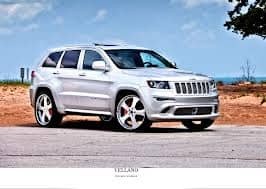Chrysler Agrees to Recall 2.7 Million Jeeps due to Fire Danger
Chrysler Agrees to Recall 2.7 Million Jeeps due to Fire Danger
After a highly publicized disagreement with the government, which could have become a protracted legal battle, Chrysler has announced that it will recall 2.7 million Jeep vehicles that could potentially catch fire if rear-ended. According to an NBC news report, the U.S. National Highway Traffic Safety Administration (NHTSA) sent the automaker a voluntary recall request earlier this month that covered Jeep Grand Cherokee models from 1993 to 2004 and Liberty models from 2002 to 2007.
Government officials warned following investigations and engineering analyses that in the event of a rear-end crash, the fuel tanks in these vehicles, which are located in the rear, could puncture and cause a fire. NHTSA also estimates that this design defect may have been responsible for about 51 deaths. Chrysler officials disagreed with NHTSA’s assessment and issued a statement saying that it will not recall the vehicles because they adhered to federal standards during the years in which they were manufactured.
Chrysler Made a PR Move
But now, after this change of heart, Chrysler has entered into an agreement with NHTSA to conduct a “voluntary” campaign. As part of this deal, when the recall begins, dealers will perform a visual inspection of the vehicles and if necessary, provide an upgrade to the rear structure of the vehicle to “better manage crash forces in low-speed impacts.” Why this sudden change in position?
NBC cites an unnamed Chrysler source as saying that the company recognized that although it could have won the legal battle, it could still “lose in the court of public opinion.” The person who talked to NBC apparently told them that Chrysler sensed that this was turning into a PR nightmare for them and did what was necessary to protect their “iconic brand” and reputation.
Refusing to Take Responsibility
It appears that Chrysler has been dragging its feet on this Jeep recall for many years now. More than 50 people, including several children, have lost their lives as a result of these defectively designed vehicles. Although Chrysler changed the design on later-model Jeep vehicles, they did not recall the earlier models in spite of knowing that they are dangerous and defective vehicles. It is appalling that Chrysler refused to recall the Jeep models after government experts pointed out that the vehicles posed a serious fire risk. In the end, Chrysler issued the recall because they feared a public relations disaster.
As an auto products liability lawyer who has financially pursued automakers including Chrysler on behalf of injured victims, I’m not surprised by their actions. This is typical of automakers who never hesitate to put profits before consumers. They are willing to fight consumer advocates and the government. What they ultimately bowed down to was the fact that their brand image could take a hit.









